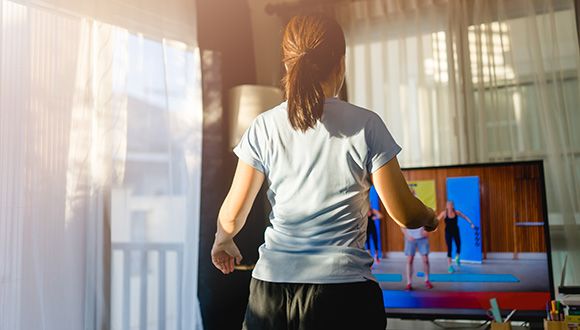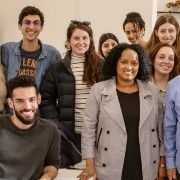Physical exercise can help improve both physical and mental health
Participating in online sports programs during the COVID-19 pandemic improves adolescents' psychological resilience
Researchers at Tel Aviv University have examined the connection between adolescents' mental resilience and their participation in sports programs during the coronavirus pandemic. The researchers found that adolescents who continued to work out in a group context during the lockdown were more mentally resilient than their peers – even though the practice sessions were conducted online. The study – the only one of its kind in the world to focus on adolescents – was conducted by Dr. Keren Constantini, Irit Marcus, Dr. Naomi Apple, Dr. Ronit Jakobovitch, Dr. Iftach Gafner and Dr. Shahar Lev-Ari, and its results were presented at a joint conference of the Schools of Public Health Organization, the Israel Association of Public Health Physicians and the Sports Physicians Association.
"We conducted the study during the general lockdown," says Dr. Lev-Ari, Head of the Department of Health Promotion at Tel Aviv University. "Some organizations and gyms had suspended their sports programs, but others - like the educational sports organization Chamesh Etzbaot (Five Fingers), adopted an online format, mostly through Zoom. We were interested in checking whether online activities helped build adolescents' physical and mental resilience. To do this we compared two groups: adolescents who continued to practice in an online group context, and their peers who exercised on their own during the lockdown."
For this purpose, Dr. Lev-Ari and his team conducted an online survey designed to test resilience levels, health behaviors and risk perceptions of 473 adolescents who had been enrolled in organized sports programs before the coronavirus outbreak. Their findings were statistically significant: Adolescents who continued to participate in sports programs through an online format during the lockdown actually practiced more, and consequently exhibited higher levels of resilience, had better self-esteem and higher morale, and expressed fewer concerns about the pandemic.
"We found that adolescents who continued to take part in their sports programs through the internet practiced more – 242 minutes of practice per week vs. only 191 minutes for adolescents who worked out on their own," explains Dr. Lev-Ari. "But this only accounts for the physical resilience. In addition, there is the aspect of mental resilience: a person's ability to cope with difficulties, burdens and stress. This has to do with an element of personal endurance that stems from personality, as well as various acquired elements – like the size of the 'battery' I have for withstanding pressure, and how quickly I can recharge it."
To test the adolescents' mental resilience, the researchers compared the results of those who practiced in an online group with the results of those who continued to work out on their own during the lockdown, based on validated questionnaires such as the Connor-Davidson Resilience Scale. These questionnaires include statements like "I tend to bounce back easily from illness or difficulty", "I don't despair easily when I fail" and "I see the amusing side of things" – with each respondent ranking how true the statement is for him/her on the given scale.
"The results were unequivocal, in all measures," says Dr. Lev-Ari. "The adolescents who continued their sports program exhibited higher spirits, less anxiety about themselves and their families, and lower levels of stress – even though their practice sessions continued through Zoom. Moreover, these adolescents were more aware of the importance of organized sports, especially at this time. 84% of the adolescents who participated in sports said that the continued practice sessions helped them cope with negative feelings and low spirits during the lockdown; 55% indicated that their contact with the coach served as a meaningful source of support. Our study proves the importance of continued activities in organized sports programs in these challenging times of the COVID-19 pandemic, and similar conclusions can certainly be deduced with regard to other social organizations as well, such as youth movements."






